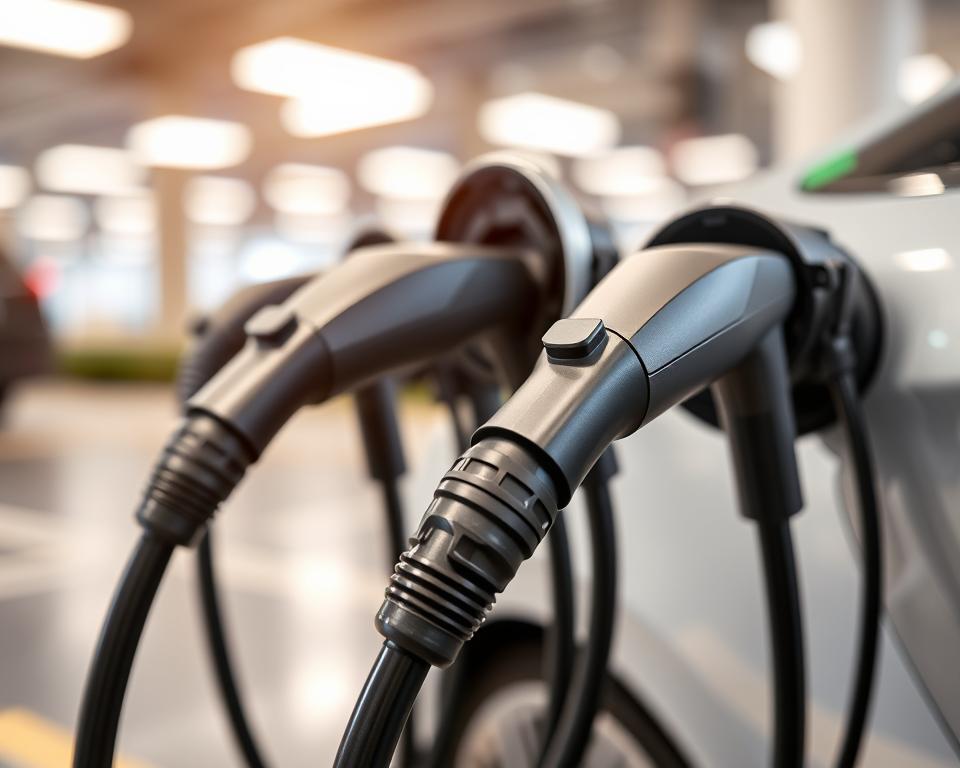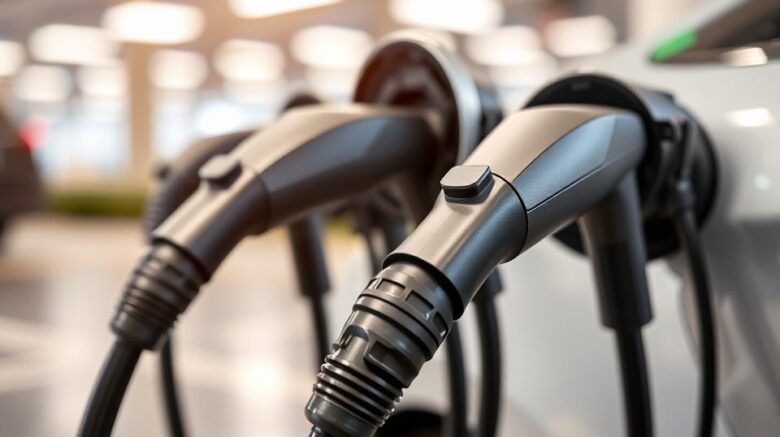Renowned EV Charging Cable Manufacturers for Your EV
EV adoption is booming, with the demand for reliable and high-performance charging solutions growing exponentially. As of now, leading companies have been at the forefront of this change, providing high-quality charging infrastructure. Southwire, for instance, has been a significant player since 2014, boasting over 1000 five-star reviews and 75 years of experience in the electrical construction industry.
The upswing in electric vehicle adoption necessitates the need for robust, fast, and reliable Charger Manufacturers in China. Key suppliers are developing to meet these evolving needs, offering products that boost the overall charging experience.
Understanding the differences between various charging solutions matters for choosing correctly. Quality charging infrastructure has a direct effect on vehicle performance and customer satisfaction.
Major Highlights
- Key suppliers deliver top-tier cables enhancing lifespan and protection.
- EV market expansion drives need for high-efficiency chargers.
- Industry leaders develop cutting-edge products for EV drivers.
- High-grade cables improve energy transfer and driving range.
- Opting for top-tier cables yields future savings.

The Growing Importance of Quality EV Charging Cables
As more drivers choose EVs, the value of top-grade EV charging cables cannot be overstated. The performance, security, and reliability of electric vehicle charging systems hinge upon the quality of the charging cables used.
The Evolution of Electric Vehicle Charging Technology
Electric vehicle charging technology has undergone significant advancements in recent years, with a focus on faster charging speeds and improved safety features. Modern EV charging cables are built for these requirements, incorporating high-grade materials and advanced designs to minimize power loss and maximize transfer rates.
Why Quality Matters in EV Charging Infrastructure
Premium cables enhance both safety and functionality in EV systems. Durable features, such as weather resistance and temperature tolerance, ensure reliable operation across various environments. Moreover, regulatory compliance and adherence to industry guidelines are crucial in guaranteeing safe operation.
| Key Features | Benefits |
|---|---|
| Superior materials and construction | Reduced energy waste |
| Enhanced durability features | Weather resistance, flexibility in extreme temperatures |
| Standards adherence | Certified safety |
| Maintainability | Long-term value proposition, reduced waste |
Products from Aichie Tech Electronics pass The Cable Lab’s stringent tests. By opting for serviceable Portable EV Charger Manufacturer, owners save money long-term through repairs, reducing waste and protecting the planet.
Premier Chinese EV Cable Suppliers
A surge of cable makers in China supports the EV boom. They play a key role in global EV infrastructure, providing high-quality automotive cables designed for different applications.
Wottz: Industry Leaders Since 2014
Wottz has established itself as a prominent player in the EV charging cable market since 2014. They offer a range of cables that cover Mode 1–4 charging standards, including Mode 1, 2, 3, and fast-charging Mode 4 DC Charging.
Aichie Tech Electronics – 75 Years in Electrical Solutions
Aichie Tech Electronics leverages 75 years of electrical expertise in its EV cables. Their products are designed to meet the demands of both domestic and commercial EV charging infrastructure.
More Leading EV Cable Brands
Specialists in Type 1/Type 2 connectors and environmental-resistant cables are emerging players. These include specialists in Type 1 (J1772) and Type 2 (Mennekes) connectors, as well as brands innovating in cable durability and adaptability.
Understanding Different Types of EV Charging Cables
As electric vehicles become increasingly popular, understanding the various types of EV Charging Cables is crucial for optimal charging experiences. Knowing cable types ensures you pick the right charger. The variety in EV charging infrastructure demands a closer look at the different cable types available.
Type 1 vs Type 2 Explained
Type1 and Type2 charging cables are two common standards used for EV charging. Type 1, also known as SAE J1772, is predominantly used in North America, while Type 2, or Mennekes, is the European norm. The right cable matches your car and charger. Type 2 cables often support higher charging capacities, making them suitable for faster charging.
Level2 and DC Fast Charging Solutions
Level 2 AC cables charge faster, up to 19.2 kW. DC Fast Charging cables, on the other hand, enable quick top-ups by on-site AC→DC conversion, delivering rapid fill-ups. These cables are essential for long-distance EV travel, letting EVs charge in minutes.
Portable and Tethered Cable Options
Granny chargers plug into home outlets for emergency use. Tethered cables are attached permanently, providing a convenient but less flexible charging solution. The choice comes down to flexibility vs convenience.
Cable length, power rating, and connector type matter most. For instance, portable charging cables range from simple L1 cords to full L2 kits. Vehicle-to-load (V2L) cables represent an emerging category, enabling EVs to power external devices.
- Flexible granny chargers and L2 units suit various needs.
- Tethered cables are permanently attached to charging stations, limiting flexibility but eliminating the need for personal cables.
- Lengths vary from 5 m to 50 m—choose wisely.
Attributes of Premium EV Cables
Premium cables stand out for durability, safety, and performance. These features are vital to safe, efficient charging.
Durability and Weather Resistance
Cables must withstand rain, sun, and cold. Manufacturers like Wottz and Southwire use RoHS-compliant recyclable compounds, ensuring they withstand various environmental conditions. Their serviceable design facilitates easy maintenance and promotes recycling.
User-Friendly Design
Cables need to flex yet remain tough. High-quality EV charging cables are designed to be flexible, making them easier to handle and maneuver. This flexibility does not compromise their durability, as they are built to withstand regular use.
Safety Certifications and Compliance Standards
Approved safety marks ensure reliable performance. They ensure their products meet or exceed standards such as IEC62196 for connectors and UL2594 in North America. Independent labs verify safety, toughness, and weatherproofing.
| Certification | Description | Region |
|---|---|---|
| IEC62196 | Connector safety standards | International |
| UL2594 | Standard for electric vehicle supply equipment | North America |
| ROHS | Restriction of hazardous substances | International |
Emphasizing these attributes yields cables that are safe, durable, and user-friendly.
Next-Gen Charging Cable Tech
The latest developments in EV charging cable technology are revolutionizing the way we charge our vehicles, with a focus on speed, reliable data transfer, and eco-friendly materials.
Thermal-Managed Fast Charging
Cooling fluids enable higher charge rates, minimizing thermal throttling during high-power sessions.
Signal-Boosting Contact Designs
Hyperboloid contacts are being integrated into EV charging cables to enhance signal integrity, ensuring reliable and efficient data transfer during the charging process.
Eco-Friendly Cable Compounds
Leading manufacturers are prioritizing sustainability in their cable designs, minimizing ecological footprint with RoHS-compliant, serviceable builds. For instance, companies like Aichie Tech Electronics and Wottz are adopting serviceable design philosophies and RoHS compliance to minimize waste and promote recycling.
Programs for cable recycling, non-toxic compounds, and TPU sheaths mark the eco shift.
Buyer’s Guide to EV Charging Cables
Choosing the right EV charging cable is crucial for efficient and safe charging. To make an informed decision, consider several key factors.
Matching Cable to Vehicle
Verify your car’s inlet and cable plug match. Your vehicle’s onboard charger capacity sets the upper limit for AC power.
Picking the Right Cable Length
Select a cord length based on parking and outlet location. A longer cable provides more flexibility but may be heavier and less manageable.
Power Rating & Charge Rate
Match your cable’s power handling to your vehicle’s capabilities. Standard Level 2 home charging operates at 7.2 kW, but some vehicles support up to 19.2 kW with appropriate electrical service.
Mind these points to pick a cable that fits your EV lifestyle.
Conclusion: Investing in Quality EV Charging Infrastructure
As the electric vehicle market continues to expand, the importance of quality charging infrastructure cannot be overstated. Investing in premium EV charging cables from established manufacturers like Wottz and Aichie Tech Electronics ensures superior durability and lower lifetime costs. Their serviceable designs allow for component replacement, reducing waste and costs. This approach supports eco-friendly EV use.
Selecting top-grade infrastructure prepares you for next-gen charging.
